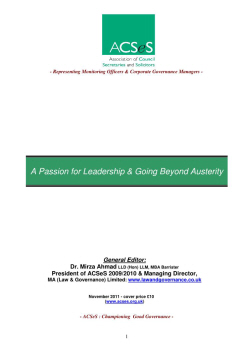Incoming, but under the radar
- Details
The Hethel judgment of 2010 has slipped by almost unnoticed, but has profound implications for the governance of shared services arrangements, writes Linda Walker
Let’s start with a quiz question… so what is the connection between the Hethel Case and Lotus Sports Cars? Before you consider the answer, readers may wonder why this case, decided in the Court of Appeal on 30 July last year, should be the subject of an article about governance and ,in particular, constitutions and joint arrangements of local authorities.
As local authorities are increasingly contemplating the introduction of shared services, this is a timely reminder of the legal limitations when structuring their governance models
The case of R v South Norfolk District Council ex parte the friends of Hethel passed into case law almost without comment as far as its impact upon constitutions of local authorities. However, this article highlights the serious pitfalls and implications that follow from the case for joint arrangements between local authorities.
The Case
The Court of Appeal considered the case on 30 July 2010. It concerned the delegation of functions to a local authority planning committee where the relevant part of the Council Constitution required certain decisions to be made by a special majority of two thirds.
The claimant sought a judicial review on the basis that the decision by the committee was unlawful because the two thirds requirement infringed paragraph 39 (1) of Schedule 12 of the Local Government Act 1972 which requires that decisions can only be reached by a simple majority.
The Court ruled that decisions by a local authority committee, and by implication a joint committee, must be made by a simple majority notwithstanding the contrary terms of the Council’s Constitution. If a decision is not taken correctly in accordance with this case, i.e. by a simple majority, the decision may be ultra vires and therefore open to challenge.
The case was about the delegation of functions to a planning committee but a number of key points were not argued in the case in terms of the wider impact of this decision beyond its specific facts.
First, there was no debate in the case about the wider impact of the decision on governance and constitutional issues. Is its application restricted to regulatory functions, or to committees within the Council’s own governing constitutional frameworks? For example many Councils enter into inter-authority arrangements involving joint committees, deploying section 101 of the Local Government Act 1972 and sections 19/20 of the Local Government Act 2000, covering executive and non-executive functions.
These structures are often intended to work as partnerships with the partner authorities acting and deciding matters as ‘equals’ and determining matters on the basis of unanimity. The central, but perhaps unresolved issue, is to what extent authorities are free to develop inter authority decision-making frameworks after Hethel?
Is the principle of freedom to contract now fettered by the case so that Councils can no longer make decision-making provisions as they choose? If so, this will be a major concern as authorities will understandably wish to have the right to veto decisions where a majority decision might overrule their wishes
Councils frequently enter into inter authority contractual models at both regional and sub-regional level. They will become more common as they contemplate shared services arrangements for their functions.
Most of these arrangements are joint committees within the meaning of paragraph 39 (1) of Schedule 12 of the 1972 Act and ‘by implication’ the Hethel case means that local authorities cannot provide, as part of their governance arrangements, for decisions being taken on the basis of unanimity. Lord Justice Sullivan, giving the lead judgment in the case, stated that the effect of paragraph 39 (1) (of Schedule 12 of the 1972 Act) could not be overridden by constitutional provisions requiring special majorities.
Implications
Going forward, local authorities are advised to review their Council Constitutions and also their inter authority arrangements with other authorities. This would be with a view to examining ways of avoiding the implications of Hethel upon joint arrangements where appropriate. For example, by managing decision-making to avoid formal votes to informally test whether a unanimous decision can be secured. In some cases key matters for decision may have to be reserved to member authorities themselves to avoid the rigour of the effect of this case. The risks of challenge by way of judicial review are highest in those areas where particular functions are susceptible to challenge – for example, waste disposal partnerships where environmental interests are likely to be prevalent.
The risks of challenge by way of judicial review are highest in those areas where particular functions are susceptible to challenge – for example, waste disposal partnerships where environmental interests are likely to be prevalent.
Care will have to be taken in drafting provisions to avoid the ramifications of Hethel. Local authorities involved in partnerships will have their own commercial and financial reasons for ensuring that decisions are not taken on a simple majority basis to avoid prejudice to their interests within the partnership itself.
The connection between Hethel and Lotus Sports cars, I hear you ask? The case itself involved planning permission to erect three wind turbines on a site owned by Lotus Cars Limited!
Linda Walker is Head of Public Law and Corporate Governance at Dickinson Dees LLP
Deputy Director Legal and Democratic Services
Governance Lawyer
Legal Director - Government and Public Sector
Regulatory/Litigation Lawyer
Legal Adviser
Locums
Poll
















